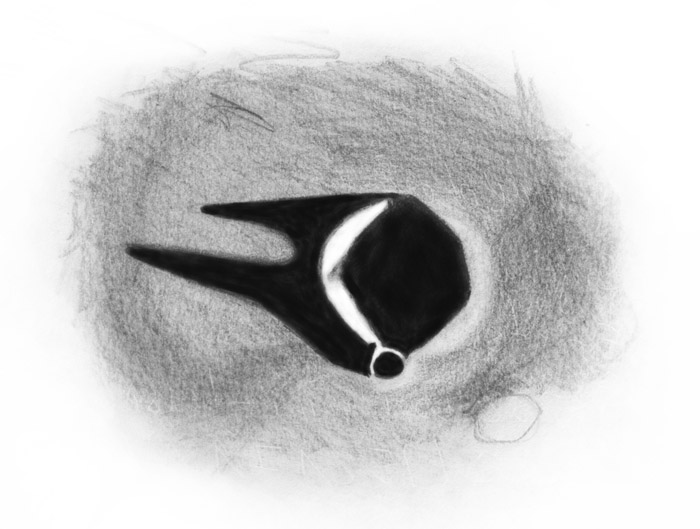Difference between revisions of "May 18, 2012"
| Line 6: | Line 6: | ||
<em>image by [mailto:lspix@netcologne.de Lambert Spix], Germany</em><br /> | <em>image by [mailto:lspix@netcologne.de Lambert Spix], Germany</em><br /> | ||
<br /> | <br /> | ||
| − | I remember being fascinated by various generations of old BAA* lunar observing reports, and indeed by many of the illustrations in Goodacre's excellent 1931 book, <em>The Moon.</em> Lambert's drawing could come from that period for it is focussed tightly on a single feature, and everything else that a camera would capture is ignored. Many of the classic maps of the 1800s were compiled from hundreds of individual drawings, some of which were of single features. And then, years later, an observer would note something on the Moon that differed from the maps and excitement would reign about changes on the Moon. Drawings are wonderful and often evocative, but they are interpretation and selections rather than unbiased documentations. This drawing of Lambert's depicts a fascinating observation of what he calls the horns of Kies A. Danny Caes had [ | + | I remember being fascinated by various generations of old BAA* lunar observing reports, and indeed by many of the illustrations in Goodacre's excellent 1931 book, <em>The Moon.</em> Lambert's drawing could come from that period for it is focussed tightly on a single feature, and everything else that a camera would capture is ignored. Many of the classic maps of the 1800s were compiled from hundreds of individual drawings, some of which were of single features. And then, years later, an observer would note something on the Moon that differed from the maps and excitement would reign about changes on the Moon. Drawings are wonderful and often evocative, but they are interpretation and selections rather than unbiased documentations. This drawing of Lambert's depicts a fascinating observation of what he calls the horns of Kies A. Danny Caes had [https://the-moon.us/wiki/Kies earlier] noted this interupted shadow and correlated it with the <em>[http://www.lazzarotti-hires.com/images/moon/bullialdus-kies20061229_lazz.jpg wings]</em> to the west of the crater. Such wings are ejecta ridges often formed by simultaneous impacts of adjacent craters, such as secondaries. They also seem to form at some single craters and perhaps indicate oblique impact. The LRO QuickMap [http://target.lroc.asu.edu/da/qmap.html?mv=eqc&mcx=-688552.88173&mcy=-858269.59094&mz=9 shows] that the western rim of Kies A is 350 to 450 m lower than immediately adjacent rim segments, and that the wings reach about 65 m in height. I wonder if the wings contain the material missing from the western rim? A simple model, now possible because of the topographic data, can answer that question.<br /> |
<br /> | <br /> | ||
<em>[mailto:tychocrater@yahoo.com Chuck Wood]</em><br /> | <em>[mailto:tychocrater@yahoo.com Chuck Wood]</em><br /> | ||
| Line 15: | Line 15: | ||
<br /> | <br /> | ||
<strong>Related Links</strong><br /> | <strong>Related Links</strong><br /> | ||
| − | Rükl plate [ | + | Rükl plate [https://the-moon.us/wiki/R%C3%BCkl+53 53]<br /> |
Lambert's [http://www.sky-scout.de/ website]<br /> | Lambert's [http://www.sky-scout.de/ website]<br /> | ||
<br /> | <br /> | ||
Revision as of 19:32, 18 August 2018
Horns And Wings

image by Lambert Spix, Germany
I remember being fascinated by various generations of old BAA* lunar observing reports, and indeed by many of the illustrations in Goodacre's excellent 1931 book, The Moon. Lambert's drawing could come from that period for it is focussed tightly on a single feature, and everything else that a camera would capture is ignored. Many of the classic maps of the 1800s were compiled from hundreds of individual drawings, some of which were of single features. And then, years later, an observer would note something on the Moon that differed from the maps and excitement would reign about changes on the Moon. Drawings are wonderful and often evocative, but they are interpretation and selections rather than unbiased documentations. This drawing of Lambert's depicts a fascinating observation of what he calls the horns of Kies A. Danny Caes had earlier noted this interupted shadow and correlated it with the wings to the west of the crater. Such wings are ejecta ridges often formed by simultaneous impacts of adjacent craters, such as secondaries. They also seem to form at some single craters and perhaps indicate oblique impact. The LRO QuickMap shows that the western rim of Kies A is 350 to 450 m lower than immediately adjacent rim segments, and that the wings reach about 65 m in height. I wonder if the wings contain the material missing from the western rim? A simple model, now possible because of the topographic data, can answer that question.
Chuck Wood
- British Astronomical Association
Shameless Plug: Don't forget to download the free BLiSS iPad app!
Technical Details
30.4.2012, 23:00h - 23:30h MESZ (21:00h - 21:30h UT). Celestron CPC 9,25" @ 250x
Related Links
Rükl plate 53
Lambert's website
Yesterday's LPOD: A Family Affair
Tomorrow's LPOD: Circumferential Ups And Downs
COMMENTS?
Register, Log in, and join in the comments.



